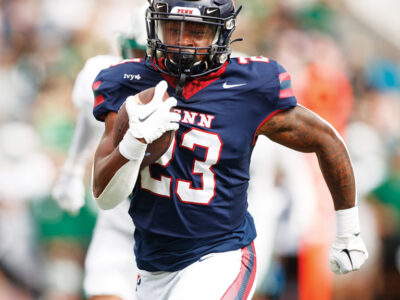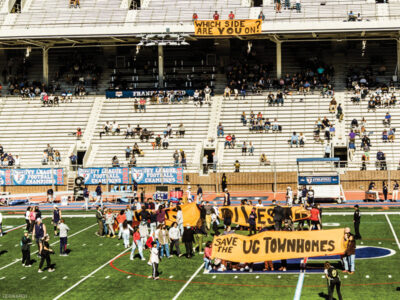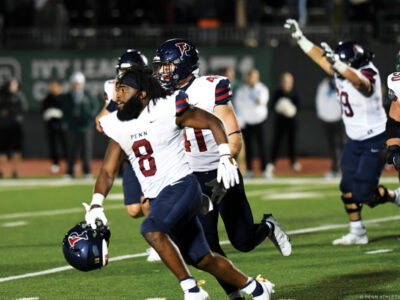The football team is looking for some new stars.
By David Porter
Change and continuity have marked Al Bagnoli’s 10 years as Penn’s head football coach, most evident in the assembly line of elite running backs who have passed through Franklin Field and into Quaker athletic lore. From Bryan Keys C’90, who pre-dated Bagnoli and graduated as the program’s all-time leading rusher, through Sundiata Rush W’93, Terrance Stokes C’95, Jasen Scott W’98, Jim Finn W’99, and, finally, Kris Ryan C’02, who broke Keys’s career mark, Penn has been blessed with a steady supply of backs who have played starring roles in the Quakers’ four Ivy League title runs.
Whether or not that trend will continue this season is one of many questions facing a Quaker team seeking to fill several gaping holes from last season’s 8-1 squad that came agonizingly close to finishing undefeated in the Ivies for the third time under Bagnoli. Were the Quakers the cast of a Broadway show, it would be a cast made up mostly of understudies that will line up on September 21 for the season opener at Lafayette.
There may be no one in Division 1-AA better equipped to handle the year-to-year upheaval than Bagnoli, who in his 20 years as a head coach at Penn and Union (N.Y.) College has experienced just one sub-.500 season, that being the 1997 campaign in which five games were forfeited due to an ineligible player [“Gazetteer,” February 1998].
“So much of character involves how you handle stress points,” Bagnoli said in a recent interview in his office overlooking Franklin Field, where workmen were busy raising the goalposts under a relentless midday sun. “And there are stress points even in pre-season. It’s hot, it’s humid, you’re tired, you’re sore. Then you really see what kind of leadership your kids have, what kind of work ethic, tenacity, mental and physical toughness. We were fortunate last year in that we had 22 seniors and were very even-keeled. But you knew they were always going to play hard, they were going to be physical and play for the entire 60 minutes. They really had a nice mindset. Now we, as coaches, have to make sure that that mindset gets instilled and carried on by this next group of kids.”
The Quakers were hit hard by graduation at the marquee offensive positions, losing Ryan and quarterback (and Ivy League MVP) Gavin Hoffman W’01, the latter now sitting atop the Penn career passing charts with 7,542 yards and 50 touchdowns. Of the players who are being considered to replace Ryan, one of the most intriguing may be senior Stephen Faulk, a second-team All-Ivy selection as a cornerback last season who may switch to the offensive backfield this season. Faulk, a sprinter on the Penn track team who has run the 100 meters in 10.56 seconds, was a standout running back in high school for Loyola Prep of Los Angeles. Another hopeful is sophomore Mike Recchiuti, who sat out last season with a knee injury but was the leading rusher in the state of Pennsylvania as a senior at Downingtown High in 2000.
As of this writing, Bagnoli had settled on senior Mike Mitchell as his starting quarterback. Mitchell sat out last season for personal reasons, but was effective in limited action in 2000. He will have two surehanded targets in tight end Matt Michaleski, a junior, and wide receiver Rob Milanese, a senior who is just 123 yards short of breaking the record of 2,419 yards received set by Don Clune C’74, which is Penn’s oldest career record on the books. Despite losing All-Ivy performers Jeff Hatch C’01 and John Zepeda C’02, the offensive line is solid with sophomore Mike Powers, co-captain Matt Dukes, and Dylan D’Ascendis (both in their junior years) returning.
For the Quakers’ defense, duplicating last season’s feat of allowing the fewest rushing yards in Division 1-AA is unlikely after the losses to graduation of three starters, including first-team All Ivy linemen Jon Galan C’02 and Ed Galan C’01. But three juniors—linebacker Travis Belden and lineman Chris Pennington, co-captains who were also named first-team All-Ivy last season, and leading tackler Steve Lhotak—are the anchors of a unit that should leave its mark on opposing ballcarriers.
“We have the makings of a pretty good team,” Bagnoli said, “but a lot of it will depend on chemistry and leadership and those types of intangibles.”
The informal, keg-party atmosphere at Penn soccer games will be a thing of the past beginning this fall, which is not necessarily a bad thing. The wooden bleachers on the east sideline—which could not accommodate the growing number of spectators in recent seasons—are being replaced by stadium seating, thanks to generous contributions by Jeffrey Rhodes C’69 WG’71, Paul F. Miller Jr. W’50 Hon’81, and Marc Rapaport W’79. The grandstand will hold 600-700 spectators and will have a VIP section. A brick wall will border the field between the 18-yard boxes.
According to Athletic Director Steve Bilsky W’71, the department is also considering replacing the artificial turf at Franklin Field, perhaps as early as next year. There is some sentiment for natural grass, but Bilsky pointed out that a synthetic surface such as NeXturf, in use at Veterans Stadium since March 2001, would better stand up to the pounding from football, field hockey, lacrosse, track and field, intramurals, and other activities that currently take place on Franklin Field. NeXturf has gotten good reviews around the NFL, though the Eagles had to cancel a pre-season game with the Baltimore Ravens a year ago due to problems with the seams in the field.
Bilsky also said he would be monitoring the condition of the surfaces in the Palestra and Weightman Hall, where the basketball team holds practices. Foot and lower-leg injuries to several players over the last few years have given rise to speculation that the lack of “give” in those surfaces was a contributing factor. (Facing a similar situation, Princeton recently replaced the floor of Jadwin Gym at a cost of approximately $1 million, according to published reports).
The original Palestra floor from the mid-1920s was replaced about 20 years ago, according to Bilsky, who is a reliable authority on the subject. The former three-time All-Ivy guard managed to acquire several of the original boards and have them fashioned into a bar for his former house in Havertown, Pa.
Gazette sports columnist David Porter C’82 is the author of Fixed: How Goodfellas Bought Boston College Basketball.




